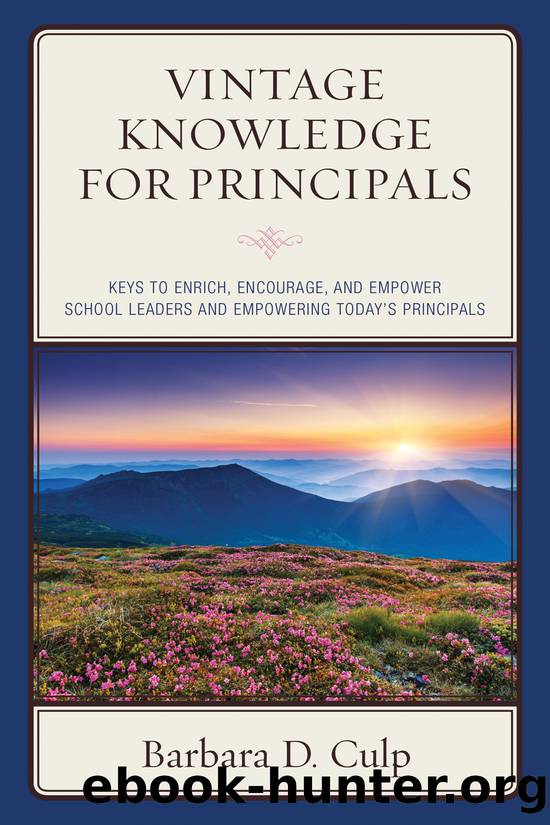Vintage Knowledge for Principals by Culp Barbara D.;

Author:Culp, Barbara D.;
Language: eng
Format: epub
Publisher: Rowman & Littlefield Publishers, Incorporated
Part III
Wisdom for You
Lead by Example
Lead by example means you guide others by demonstrating the activities and attitude you want throughout your school.
Lead by example touches on the core of your position at the school. As the head of the facility, you are not just a manager, you are a leader. An inclusive attitude, persistence in the face of daily challenges, and patience with all the minor annoyances that come with herding hundreds of kids toward educational goals inspires your staff to do the same. When others see the effort you put into every hour, they have a yardstick against which to measure their own efforts. Leading by example encourages others to step up, take on responsibilities above their job description, and rockets your school to success!
When you lead by example, you affirm that ever personâs job is as important as the other personâs. You might, for example, fill in for a cafeteria manager or custodian when their sudden absence is unavoidable and no one else can perform their duties. Your effort sends a clear message about how highly you value those tasks. As a bonus, you can better assess the worth of their job and the daily challenges they face.
To lead by example, never ask an employee to do something you would not. Treat others as you would like to be treatedâwith courtesy, respect, and the dignity they deserve. Recognize people as your most valuable asset and express your appreciation often.
Never Stop Learning
Never stop learning keeps you up to date with current research into educational methods and administrative procedures.
Never stop learning isnât just a rallying cry for students ⦠itâs equally important for principals. When you position yourself on the cusp of new techniques and reaffirm the effectiveness of traditional methods, your perspective is broad enough to make wise choices. Youâll also be innovative and discover the best improvements. It enhances your performance and your impact on teachers and students.
Never stop learning is accessible right in your own school. Rather than call in outside experts, turn to ones in your school or district. After a regional conference, invite teachers and administrators throughout your state for an informal lunch to discuss the highlights. Create an internal forum where teachers and staff can post ideas, ask for advice, and glean the benefit of other peopleâs experiences. As you help others, youâll reaffirm good practices in your own approach.
Many pathways help you never stop learning. DVDs, podcasts, and web-based workshops can keep you abreast of the latest procedures. Engaging with online educational communities ties you into trending thoughts, opinions, and new ideas. Follow every conference or learning event by asking âWhat worked well?â âWhat didnât work as well as Iâd hoped?â and âWhat could I have done differently?â When you never stop learning, every step propels you forward.
Own Mistakes
Owning mistakes recognizes that youâre human and are occasionally going to misstep. While owning your own mistakes is important, you also have to own the mistakes of your teachers and staff. You are, after all, the leader.
Download
This site does not store any files on its server. We only index and link to content provided by other sites. Please contact the content providers to delete copyright contents if any and email us, we'll remove relevant links or contents immediately.
The Art of Coaching Workbook by Elena Aguilar(50168)
Trainspotting by Irvine Welsh(21078)
Twilight of the Idols With the Antichrist and Ecce Homo by Friedrich Nietzsche(18324)
The Secret History by Donna Tartt(18269)
All the Missing Girls by Megan Miranda(14858)
Cat's cradle by Kurt Vonnegut(14804)
Ready Player One by Cline Ernest(14063)
Talking to Strangers by Malcolm Gladwell(12916)
Fangirl by Rainbow Rowell(8819)
The Compound Effect by Darren Hardy(8544)
Thirteen Reasons Why by Jay Asher(8493)
The remains of the day by Kazuo Ishiguro(8433)
Periodization Training for Sports by Tudor Bompa(7947)
Tools of Titans by Timothy Ferriss(7850)
Wonder by R. J. Palacio(7756)
The Lover by Duras Marguerite(7605)
Change Your Questions, Change Your Life by Marilee Adams(7405)
A Court of Wings and Ruin by Sarah J. Maas(7307)
The Complete Stick Figure Physics Tutorials by Allen Sarah(7162)
